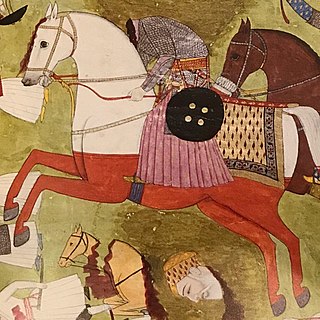Top Qs
Timeline
Chat
Perspective
Wazir Khan (Sirhind)
Mughal nobleman and administrator (1635–1710) From Wikipedia, the free encyclopedia
Remove ads
Mirza Askari (Persian: میرزا عسکری, c. 1635 – 12 May 1710), better known by his title Wazir Khan, was a Indo-Persian minor noblemen of Mughal Empire, serving his positions Amin of Chakla Sirhind, also as military commander (Faujdar) and regional Revenue Collector/Commissioner (Dewan), as well as (Deputy-Governor/Subehdar) of the Sirhind region as the local administrative Sarkar (government) under Delhi Subah of Mughal Province, as he was the Mansabdar of 5,000 zat (foot infantries) and 4,000 swars (cavalrymans), in the present-day Indian state of Punjab, and his administering territory that lay between the Sutlej and Yamuna rivers, he was regional deputy-governor under many representative Delhi Subehdars like Munim Khan II and Ghazi ud-Din Khan Feroze Jung I. He was best known for his conflicts with the Sikhs.[2][3][4][5]
Remove ads
Biography
Summarize
Perspective
Background
Mirza Askari (Wazir Khan) was born around 1635 CE. his father was Mirza Zahir Khan, Mirza Askari was the descendant of Wazir Khan Akbar Shahi of Persian descent who originally from Iran, who was the served as Courtrian to the third Mughal Emperor Akbar.[5]
Other sources claiming about his origin
According to Sikh sources, Mirza Askari (Wazir Khan) was the native of then Kunjpura and Karnal district of modern-day Haryana.[6] other Sikh accounts suggest that Wazir Khan was a distant relative of the Nawabs of Malerkotla, which, if true, would suggest an Afghan origin for him.[7]
Administrations
He serving as deputy-governor/subahdar in the Sirhind region as Sarkar of all localized administrations, he hold as (Faujder) a military commander and Amin (Dewan) which was referred to as a revenue collector to the under Mughal Province of Delhi Subah.
Wazir Khan is noted for his conflicts with the Sikhs and became infamous for ordering the execution of Guru Gobind Singh's young sons (Sahibzada Fateh Singh and Sahibzada Zorawar Singh) in 1704.[8] He was the governor of Sirhind when he arrested the two younger sons of Guru Gobind Singh. Wazir Khan tried to force the young sons of the Guru to embrace Islam. When they refused to accept Islam he ordered them to be bricked alive and later beheaded them after knowing that they were still alive inside even though that was not in the order.[9]
Wazir Khan was defeated and beheaded by a Sikh warrior Fateh Singh, a warrior in the Sikh Khalsa, during the Battle of Chappar Chiri on 12 May 1710.[10] His body was desecrated, dragged by an ox, and then hung onto a tree.[11]
Remove ads
References
Wikiwand - on
Seamless Wikipedia browsing. On steroids.
Remove ads

